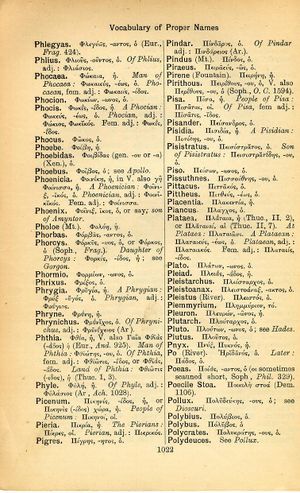Phocis
Πατὴρ οὐχ ὁ γεννήσας, ἀλλ' ὁ θρέψας σε → Non qui te genuit, est qui nutrivit pater → Dein Vater ist, wer Nahrung dir, nicht Leben gab | nicht Vater ist, wer Leben, sondern Nahrung gab
English > Greek (Woodhouse)
Φωκίς, -ίδος, ἡ.
A Phocian: Φωκεύς, -εως, ὁ.
Phocian, adj.: Φώκιος, Φωκικός. Fem. adj.: Φωκίς, -ίδος.
Latin > English (Lewis & Short)
Phōcis: ĭdis, f., = Φωκίς,
I the country between Bœotia and Ætolia, in which were the mountains of Parnassus and Helicon, the Castalian spring, and the river Cephisus, Mel. 2, 3, 4; Plin. 4, 3, 4, § 7; Liv. 28, 5, 16; Ov. M. 1, 313; Stat. Th. 1, 64.—
2 Transf., erroneously, in consequence of the similarity in the sound, for Phocœa: Phocide relictā, Graii, qui nunc Massiliam colunt, etc., Sen. Cons. ad Helv. 7, 8; Luc. 3, 340; 4, 256; Sid. Carm. 23, 13; Gell. 10, 16, 4.—Hence,
A Phōcenses, ium, m., the Phocians, Plin. 3, 5, 10, § 72; Just. 8, 1, 2; Sol. 2.—
B Phōcēus, a, um, adj., Phocian: rura, Ov. M. 5, 276: Anetor, id. ib. 11, 348: juvenis, Pylades, son of King Strophius of Phocis, id. Tr. 1, 5, 21.—
C Phōcĭi, ōrum m., the Phocians, Cic. Pis. 40, 96.—
D Phōcăĭcus, a, um, adj., Phocian: tellus, Ov. M. 2, 569: laurus, i. e. from Parnassus, Luc. 5, 143.

